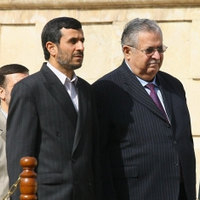A few weeks ago, the United States had cautious grounds for optimism in terms of both Iran and Iraq. Election results in Iraq had opened the possibility of a more inclusive national government being formed, one that might finally begin to build on the breathing room obtained at such cost by the surge -- and which would permit the orderly drawdown of U.S. forces over the next year. On Iran, there seemed to be an emerging international consensus that Iran's nuclear program was deserving of sanctions: Both Russia and China signaled that they were prepared to consider new measures designed to bring greater pressure to bear on Tehran, so that it would cease and desist from any efforts to move closer to acquiring a nuclear weapons capability.
The events of the last few days, however, now call both assumptions into question. Iran has accepted "in principle" the offer made by Turkey and Brazil -- both currently non-permanent U.N. Security Council members -- to restart negotiations over a proposed fuel swap deal. China has responded with cautious support for these talks, arguing that diplomatic efforts to end the standoff should be fully exhausted before moving on to another round of sanctions.
The administrations of President Barack Obama and French President Nicolas Sarkozy have assiduously courted Russian President Dmitry Medvedev, and both believed that Russia was moving closer to the French and U.S. position on Iran. Whether Russia changes tack again remains to be seen, especially after President Hu Jintao visits Moscow next week. The Chinese will likely argue that the Turkish-Brazilian mediation effort is real and has a serious chance of success, and might persuade the Russian government to join with them in delaying the discussion of another sanctions resolution at the Security Council, to allow these talks some breathing room. In advance of Hu's trip, the Chinese Foreign Ministry is already stressing that Moscow's position is quite close to that of China, so Russia, which does not share Washington's sense of urgency on the matter, is likely to agree with China's assessment.

